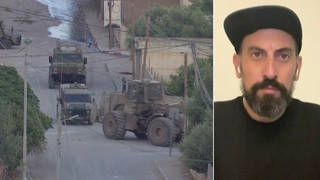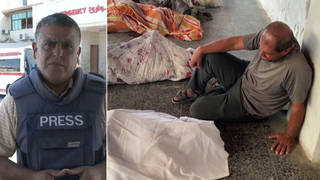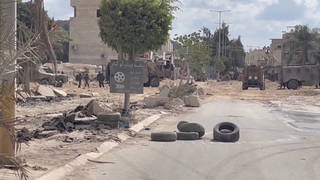This blog originally appeared here on Proof That I’m Alive.
A couple of weeks ago, I plunged into Lake Michigan. Unlike usual, the water felt warm. It was easy to run all the way in and easy to float over the waves. Montrose beach was crowded with families, pitching tents to keep out of the sun. Children played, laughed, and cried. Midwesterners who still hadn’t made it out into the sun crisped their pale shoulders. It would have been a perfectly relaxing day, but fighter jets circled above everyone’s heads — doing dives and turning every which way. Mothers plugged their children’s ears and I saw a baby wearing noise canceling headphones.
It was the Air and Water show — an annual proud display of American military capabilities. They are the same jets that fly over the shores of Gaza, dropping bombs on families. That’s what I thought about — it was just by happenstance that we were there watching these planes as a performance rather than in Gaza as a weapon of mass slaughter. The more places I travel to, the more I realize how much the world looks the same. People everywhere are really kind and generous — the only thing that separates us is if the stars align to have us born under the boot of the United States or not.
As the jets flew over our heads I felt my stomach sour. In two weeks, the Democratic National Convention would come to Chicago and it was a present opportunity to make clear the contradictions that kept me up at night. Once months and months away, the DNC was finally around the corner.
This week, members of the Democratic Party came from all parts of the country to convene in Chicago. They were coronating Kamala Harris as their presidential nominee, a woman no one really voted for. Even in the face of this blatant lack of democracy, the party members were elated to choose her. They carried signs with her husband’s name and applause erupted from the tens of thousands of people in the United Center when she declared that the United States would have the “most lethal military” in the world under her leadership. To the people well aware of the millions of people the United States killed in the last twenty years alone, her statement was a threat.
The week was marked by the obvious gaps between the people going into the United Center and the people outside of it.
There was a young woman that sat outside the exit of the Democratic National Convention on its third night reading the names of the children Israel has killed in the last ten months. She did it for hours, until her speaker battery died. She did it alone, taking care to pronounce every child’s name correctly and to say their age at the time of their murder. Without her, many of the DNC guests wouldn’t necessarily be confronted with the carnage members of their party is carrying out.
Outside the gates of the DNC I saw a young woman making sure the children of Palestine weren’t just numbers, and I saw people laughing at her for doing so. They laughed loudly and mocked her voice. They mocked the names of the dead babies. They yelled at her to leave them alone. They left the coronation ceremony livid that they had to even hear about Gaza.
That night was demoralizing, and it’s something I will remember for the rest of my life.
Democrats laugh at the names of dead children. They openly refuse to let a Palestinian speak for two minutes at their four day long event. They order riot cops on people protesting a genocide. They have their parties, fundraisers, and happy hours while bodies pile up. If they really didn’t think the genocide was so bad, they wouldn’t get so mad at us for reminding them. They knew that the people they were rallying behind are cheering on mass slaughter — they’ve just weighed their fun, their careers, and their vanity against the lives of 180,000 Palestinians and decided that nothing could be more important than themselves. I don’t care what they said to me, or my friends, but I hope our faces and our presence made them feel even an ounce of discomfort. In the best case scenario, I hope they went to sleep hearing the echoes of the martyrs’ names. I still foolishly hope they turn a corner at some point.
There’s a lot to be said about the Democratic National Convention. It happened in the city with the largest Palestinian population in the United States. Plenty of our neighbors here have lost dozens and dozens of their immediate and extended families and Kamala Harris took to the stage to promise her ironclad support to their executioners. Riot cops filed into the streets, prepared to use the kettling tactics they used from the Israeli military. All of a sudden, the place I call home felt unrecognizable. The air of the coronation felt heavy — it didn’t feel like home. There were points where I was with thousands of other people, chanting in unison, but still felt so lonely. Luxury SUVs carried important people into important buildings for important events. And between us and the importance, there were police with rifles strapped to their chests.
But there were also good people. Like the girl outside the convention. And the thousand of people that marched with us. And the Shake Shack worker that joined us because he had 15 minutes before his shift started. And the security that had to kick us out to keep their job but told us how much what we were doing meant to them.
In the lead up to the DNC, we spent so much time thinking about the last DNC that happened here in 1968. Protests against the Vietnam war took to the streets in small numbers, demanding an end to the war. They were met with horrible police brutality, and mass arrests with long legal battles in their wake. Our mentors from ‘68 urged us not to be nostalgic for those days. I still admire them for going face to face with the Chicago riot cops, but I’ve also taken their reflections of ‘68 very seriously — they didn’t end the war on Vietnam. Many of them feel like they could have focused more on building a sustainable movement that people could join for the long haul. The 2024 DNC in Chicago presented us a unique opportunity — we had to take this huge moment of mass mobilization and make sure our efforts and organization doesn’t get washed away when all the balloons on the United Center floor are popped, and the important people fly out of O’Hare. When the dust settles and the most powerful people in the world leave our city, how will we keep fighting? I was happy when so many people asked us what was next, because it meant we were thinking long term.
In our own discourses on the left, the week was consumed by the discussion of tactics – what works and what doesn’t. An organizer I know reminded us about our responsibility to be a movement people want to join. There are plenty of people who are sympathetic to our cause but haven’t figured out how to be part of it. There’s millions of people without a movement home. Our cause is already popular, it’s already growing every day. Are we doing what we can to make sure people know where to go? Are we keeping our eyes on the prize or are we getting so wrapped up in nostalgia that we can’t see what we will be capable of a year from now if we move strategically? We are nothing without the people. Our responsibility is to the people —not to our egos, not to our careers, not to the vanity of our organizations, and not to our impulses. As a movement we generally have to be better at unlearning instant gratification and also embracing a diversity of tactics. But that’s something for another day.
It is easy to stand on a police line. It’s easy to yell at politicians. It’s easy to say things and do things by yourself. It’s hard to organize your neighbors and talk to new people about things they don’t immediately understand — my hope comes from the idea that once we get really good at that, the light at the end of the tunnel will be as clear as day.
Chicagoans are loud, principled, and good people and because of that there are 2.6 million reasons to love this city. For a few days Chicagoans made certain democrats couldn’t walk around our city without seeing and hearing about the people of Gaza. It’s my hope that we see that as a small success, and also my hope that we saw the week of mobilizations as a jumping off point for building the world we want to see.
Lake Michigan is connected to the ocean through narrow waterways along the northern border of the United States, and someone mentioned at a protest that it’s not unfathomable that the waves crashing onto the shores of Gaza were once here in Chicago, and vice versa. Even if we don’t have skies that are absent of fighter jets in my lifetime, every second spent moving us towards that kind of life was worth it. As long as we don’t throw in the towel, we are closer than ever to that reality.
The post You Will Hear the Names of the Dead: The DNC in Chicago first appeared on Dissident Voice.This post was originally published on Dissident Voice.
 #BlackLivesMatter
#BlackLivesMatter
 (@SAandPalestine)
(@SAandPalestine) 

 (@CookeLeighton)
(@CookeLeighton)  URGENT
URGENT  ’s every whim & demand in support its murder0us, genoc1dal rampage – there’s none now.
’s every whim & demand in support its murder0us, genoc1dal rampage – there’s none now. Subcontractors for
Subcontractors for 



